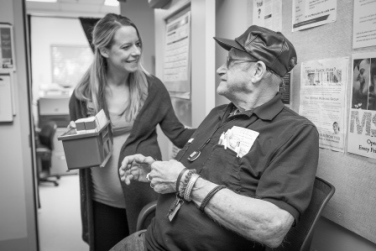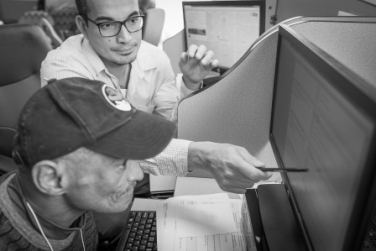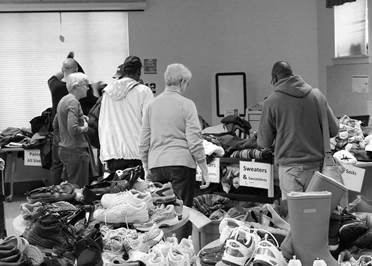Bailey-Boushay House Homefront
Newsletter November 2015 Edition
Inside this issue
Having No Place To Be | #GivingTuesday | Chefs' Dinner
 |
|
A client (J.R.) is able to relax and get some much needed rest in the BBH quiet room.
|
Having No Place To Be
BBH creates new ways to help homeless clients prepare for stable housing
Much is going well for Terry after four years as a client at Bailey-Boushay House.
He’s taking HIV medication successfully. He practices harm-reduction techniques when using street drugs and alcohol. And he signed on as a peer educator in Project NEON (an outreach network for gay, bisexual and transgender men affected by crystal methamphetamine).
Despite all these successful moves to build stability into his life, Terry is discouraged and frustrated. He’s been homeless for more than two and a half years and sees no signs of hope in his housing search.
 |
|
Nurse Kimberly Perry helps Randol manage his medication.
|
A desperate need for housing
The hardest part of being homeless is the “stress of having no stability,” he says. “You can’t depend on anything. There’s no place to keep anything. There’s no place just to be. You have to keep figuring out what you’re going to do next, all the time.”
The long, slow process to find subsidized housing is wearing Terry down. “I want a place of my own, just like everyone else. How many years do I have to wait before I find housing?”
Changes in the Bailey-Boushay client mix
Terry’s not an exception. A third of Bailey-Boushay’s 300 clients with HIV/AIDS are currently homeless. Another third are at risk of becoming homeless.
“In late 2013 and early 2014, we saw a big change,” says Brian Knowles, BBH executive director. “More homeless clients were coming in—especially younger men in their twenties—and with a much higher level of desperation. The outpatient program hasn’t been this full since 1998.”
For years, Bailey-Boushay has given vulnerable clients the support and stability they need to stay on HIV medication. Our services worked equally well for housed and homeless clients. But the chaotic lives of more recent clients have changed that pattern.
“Their most immediate needs, like where can you go to the bathroom at night, have to come first,” Brian says. “They can’t think beyond the next few minutes and hours, much less make plans to take HIV medication and maintain health long-term.”
Finding new ways to build stability
 |
|
Héctor Urrunaga Díaz, care manager and social work associate,
helps Richard navigate online forms.
|
The BBH team has committed to developing services that engage and build trust with clients in housing crisis.
Last fall it took a big step by collaborating with Lifelong AIDS Alliance in a pilot program called Winter Motel.
During the coldest months of the year, 55 of BBH’s hardest-to-house clients (including Terry) were given immediate respite through temporary housing in local motels. They were safe, had private rooms and got plenty of practical support from staff at Bailey-Boushay and Lifelong.
Preventing hospitalizations was a primary and short-term goal that met with success as Terry and the others stayed out of the hospital. Building life skills to help find and keep permanent housing is a longer-term goal. Unfortunately, by winter’s end only a handful of clients moved into permanent housing.
Taking practical steps and the long view
This fall the Winter Motel, version 2.0, was rolled out as one part of a broader, year-round approach now called the Housing Stability Project.
“We don’t want to reinvent the wheel,” Brian says, “But we’ve learned that Bailey-Boushay has unique ways to help our clients be safer and healthy while homeless.”
Participation is always voluntary. Strategic incentives — whether a grocery gift card, sleeping bag, poncho or a volunteer furniture mover — inspire clients to keep working a housing plan, complete applications, meet with outside resources, and move through a skill-building curriculum.
New services that evolve in the next few years will focus both on clients’ immediate and long-term needs. A couple of examples:
Starting with the basics: Drying socks and foot care
“The homeless have to keep moving,” says Sandy Eastwood, assistant nurse manager, “so foot care is a huge issue.”
All Bailey-Boushay clients, whether housed or homeless, can now get a clean, dry pair of white tube socks every day. No questions asked. Socks for diabetics are offered, too.
A new foot care station in the Big Room now offers relief for painful feet. Nurses, armed with formal training in foot care and professional nail tools, soak and scrub feet, cut and trim nails and treat fungal infections.
 |
|
Volunteers help organize items at a clothing swap held at the facility in October.
|
On the horizon: Finding pro bono partners
Some clients need legal help to resolve issues that block their efforts to get housing. Others need the services of a representative payee to make sure they don’t lose housing because of a late or mislaid rent check.
Bailey-Boushay welcomes calls from local professionals and firms who can provide these services free of charge to its homeless clients.
The connection between housing and HIV medication management
How do all the new Housing Stability Project services fit into the Bailey-Boushay mission?
The major goal is still improving HIV health, taking HIV medication and fostering independence.
“By helping clients meet their basic needs for food and lodging, we show them that we care about the realities of their life,” says Billy Burton, BBH social worker. “Building that trust will hopefully result in people trusting us, when they’re ready, with their medical needs.”
Back to Top
#GivingTuesday - December 1
We have a day for giving thanks. We have two for getting holiday deals. Now, we have #GivingTuesday, a global movement dedicated to charitable giving and volunteerism held on the first Tuesday after Thanksgiving.
On Tuesday, Dec. 1, families, communities and organizations around the world will unite for one common purpose: to celebrate generosity and give. You can join the thousands of people who will affect the lives of millions by donating to Bailey-Boushay House on #GivingTuesday.
Every single day, each of us has the opportunity to find a way to give back to our communities, to help those in need and to have a positive impact on those around us. Everyone can make a difference. Imagine if we all tried.
Back to Top
SAVE THE DATE!
Bailey-Boushay House Chefs’ Dinner
Sunday, Jan. 31, 2016
Take a culinary journey at the 24th annual Chefs' Dinner, an opportunity to celebrate and raise support for Bailey-Boushay House. Our featured local chefs will treat guests to an incredible hors d'oeuvres reception followed by a private and elegant multi-course dinner. Tickets go on sale Dec. 5.
For more information, visit ChefsDinner.org or contact us at (206) 223-7521 or events@virginiamason.org.
Back to Top